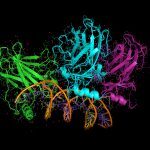Lien vers Pubmed [PMID] – 24967362
Lien DOI – 36868110.1155/2014/368681
Biomed Res Int 2014 ; 2014(): 368681
Methotrexate (MTX), the most used drug in rheumatoid arthritis (RA) treatment, showing variability in clinical response, is often associated with genetic polymorphisms. This study aimed to elucidate the role of methylenetetrahydrofolate reductase (MTHFR) C677T and aminoimidazole carboxamide adenosine ribonucleotide transformylase (ATIC) T675C polymorphisms and clinicopathological variables in clinical response to MTX in Portuguese RA patients.Study included 233 RA patients treated with MTX for at least six months. MTHFR C677T and ATIC T675C polymorphisms were genotyped and clinicopathological variables were collected. Statistical analyses were performed and binary logistic regression method adjusted to possible confounding variables.Multivariate analyses demonstrated that MTHFR 677TT (OR = 4.63; P = 0.013) and ATIC 675T carriers (OR = 5.16; P = 0.013) were associated with over 4-fold increased risk for nonresponse. For clinicopathological variables, noncurrent smokers (OR = 7.98; P = 0.001), patients positive to anti-cyclic citrullinated peptide (OR = 3.53; P = 0.004) and antinuclear antibodies (OR = 2.28; P = 0.045), with higher health assessment questionnaire score (OR = 2.42; P = 0.007), and nonsteroidal anti-inflammatory drug users (OR = 2.77; P = 0.018) were also associated with nonresponse. Contrarily, subcutaneous administration route (OR = 0.11; P < 0.001) was associated with response.Our study suggests that MTHFR C677T and ATIC T675C genotyping combined with clinicopathological data may help to identify patients whom will not benefit from MTX treatment and, therefore, assist clinicians in personalizing RA treatment.

